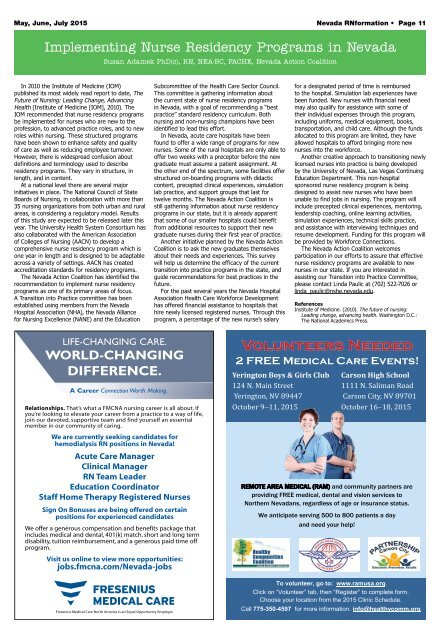Nevada RNFORMATION
You also want an ePaper? Increase the reach of your titles
YUMPU automatically turns print PDFs into web optimized ePapers that Google loves.
May, June, July 2015 <strong>Nevada</strong> RNformation • Page 11<br />
Implementing Nurse Residency Programs in <strong>Nevada</strong><br />
Susan Adamek PhD(c), RN, NEA-BC, FACHE, <strong>Nevada</strong> Action Coalition<br />
In 2010 the Institute of Medicine (IOM)<br />
published its most widely read report to date, The<br />
Future of Nursing: Leading Change, Advancing<br />
Health (Institute of Medicine [IOM], 2010). The<br />
IOM recommended that nurse residency programs<br />
be implemented for nurses who are new to the<br />
profession, to advanced practice roles, and to new<br />
roles within nursing. These structured programs<br />
have been shown to enhance safety and quality<br />
of care as well as reducing employee turnover.<br />
However, there is widespread confusion about<br />
definitions and terminology used to describe<br />
residency programs. They vary in structure, in<br />
length, and in content.<br />
At a national level there are several major<br />
initiatives in place. The National Council of State<br />
Boards of Nursing, in collaboration with more than<br />
35 nursing organizations from both urban and rural<br />
areas, is considering a regulatory model. Results<br />
of this study are expected to be released later this<br />
year. The University Health System Consortium has<br />
also collaborated with the American Association<br />
of Colleges of Nursing (AACN) to develop a<br />
comprehensive nurse residency program which is<br />
one year in length and is designed to be adaptable<br />
across a variety of settings. AACN has created<br />
accreditation standards for residency programs.<br />
The <strong>Nevada</strong> Action Coalition has identified the<br />
recommendation to implement nurse residency<br />
programs as one of its primary areas of focus.<br />
A Transition into Practice committee has been<br />
established using members from the <strong>Nevada</strong><br />
Hospital Association (NHA), the <strong>Nevada</strong> Alliance<br />
for Nursing Excellence (NANE) and the Education<br />
Subcommittee of the Health Care Sector Council.<br />
This committee is gathering information about<br />
the current state of nurse residency programs<br />
in <strong>Nevada</strong>, with a goal of recommending a “best<br />
practice” standard residency curriculum. Both<br />
nursing and non-nursing champions have been<br />
identified to lead this effort.<br />
In <strong>Nevada</strong>, acute care hospitals have been<br />
found to offer a wide range of programs for new<br />
nurses. Some of the rural hospitals are only able to<br />
offer two weeks with a preceptor before the new<br />
graduate must assume a patient assignment. At<br />
the other end of the spectrum, some facilities offer<br />
structured on-boarding programs with didactic<br />
content, precepted clinical experiences, simulation<br />
lab practice, and support groups that last for<br />
twelve months. The <strong>Nevada</strong> Action Coalition is<br />
still gathering information about nurse residency<br />
programs in our state, but it is already apparent<br />
that some of our smaller hospitals could benefit<br />
from additional resources to support their new<br />
graduate nurses during their first year of practice.<br />
Another initiative planned by the <strong>Nevada</strong> Action<br />
Coalition is to ask the new graduates themselves<br />
about their needs and experiences. This survey<br />
will help us determine the efficacy of the current<br />
transition into practice programs in the state, and<br />
guide recommendations for best practices in the<br />
future.<br />
For the past several years the <strong>Nevada</strong> Hospital<br />
Association Health Care Workforce Development<br />
has offered financial assistance to hospitals that<br />
hire newly licensed registered nurses. Through this<br />
program, a percentage of the new nurse’s salary<br />
for a designated period of time is reimbursed<br />
to the hospital. Simulation lab experiences have<br />
been funded. New nurses with financial need<br />
may also qualify for assistance with some of<br />
their individual expenses through this program,<br />
including uniforms, medical equipment, books,<br />
transportation, and child care. Although the funds<br />
allocated to this program are limited, they have<br />
allowed hospitals to afford bringing more new<br />
nurses into the workforce.<br />
Another creative approach to transitioning newly<br />
licensed nurses into practice is being developed<br />
by the University of <strong>Nevada</strong>, Las Vegas Continuing<br />
Education Department. This non-hospital<br />
sponsored nurse residency program is being<br />
designed to assist new nurses who have been<br />
unable to find jobs in nursing. The program will<br />
include precepted clinical experiences, mentoring,<br />
leadership coaching, online learning activities,<br />
simulation experiences, technical skills practice,<br />
and assistance with interviewing techniques and<br />
resume development. Funding for this program will<br />
be provided by Workforce Connections.<br />
The <strong>Nevada</strong> Action Coalition welcomes<br />
participation in our efforts to assure that effective<br />
nurse residency programs are available to new<br />
nurses in our state. If you are interested in<br />
assisting our Transition into Practice Committee,<br />
please contact Linda Paulic at (702) 522-7026 or<br />
linda_paulic@nshe.nevada.edu.<br />
References<br />
Institute of Medicine. (2010). The future of nursing:<br />
Leading change, advancing health. Washington D.C.:<br />
The National Academics Press.

















